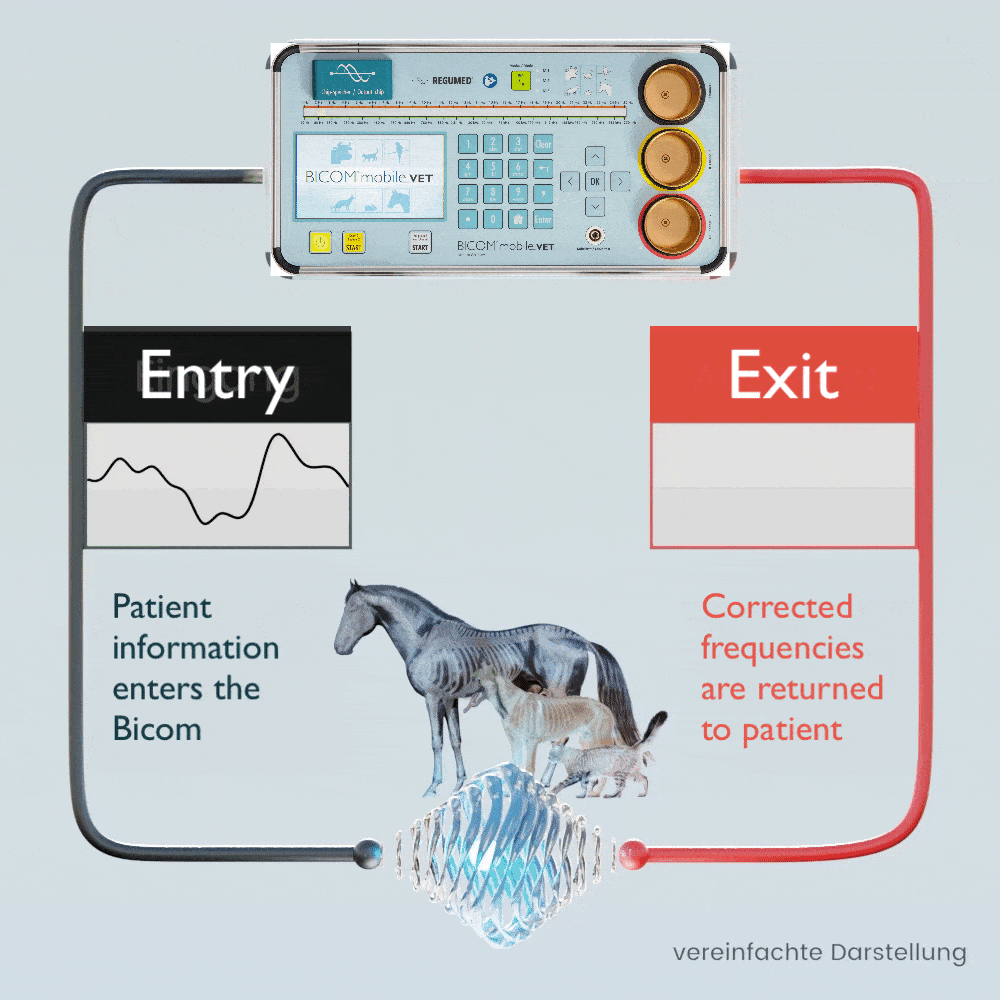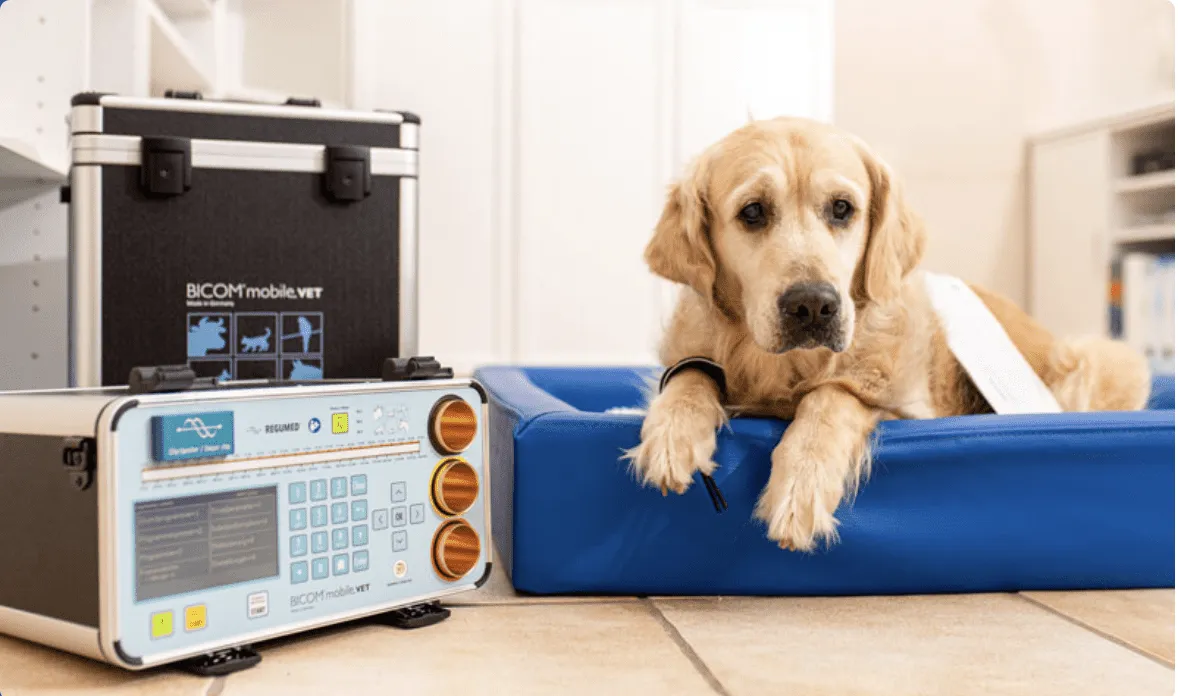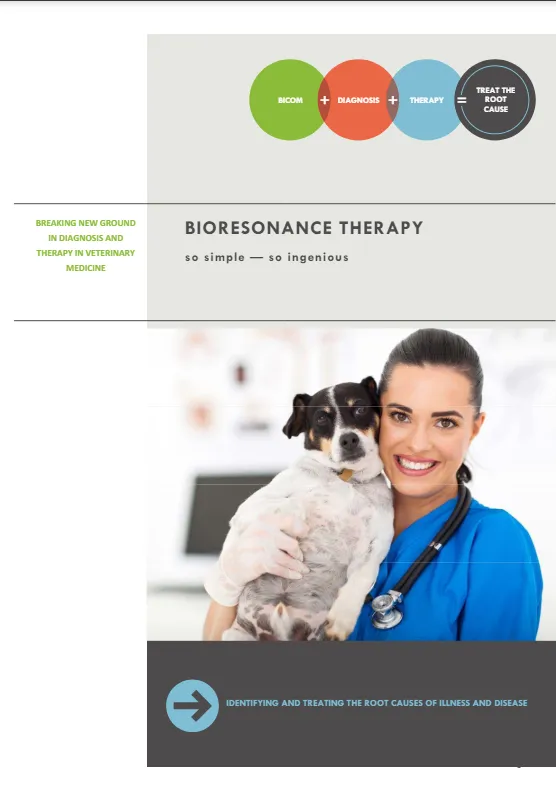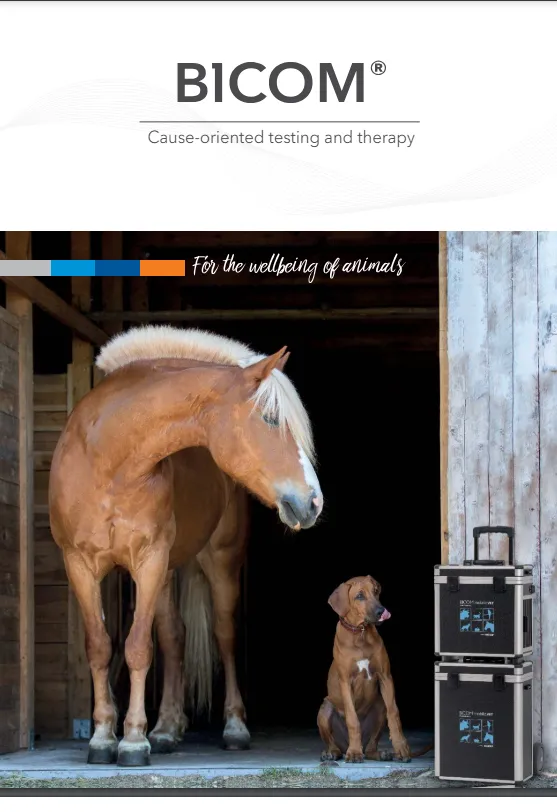Treatment with the help of the patient’s own information
in the BICOM® mobile VET bioresonance device
In contrast to other “frequency therapy devices”, BICOM® bioresonance is a method that is highly individual and perfectly tailored to the needs of the patient through the use of the patient’s own information and the possibility of testing specific wave patterns for resonance.
The patient’s own pathological and physiological information is recorded using special applicators and fed into the BICOM® mobile VET.
Depending on the therapy program, the specific wave pattern as a carrier of information is amplified, weakened or inverted and transmitted back to the patient in modulated form, which means that the transmission of information changes in clarity depending on the modulation or it disappears completely.
The treatment signals continuously adapt to the changing pathological situation of the patient. As the therapy progresses, the body’s ability to regulate is reactivated.
Find out more about this topic at our regular events. Together with veterinarians and animal naturopaths, we offer various face-to-face and online events .
The BICOM® bioresonance method is a cause-oriented, holistic treatment concept. It can narrow down the cause of the health problem in animals and find out even the hidden causes of the clinical picture.
Animals have a natural regulatory system that can also compensate for unusual influences. However, even good self-healing powers eventually reach their limits. Persistent exposure to allergens, environmental toxins, fungi, viruses, bacteria or stress and changed living conditions weaken the immune system and are often the cause of an illness. In particular, fungal infestation on the skin or chronic diseases in general are not always due to a breeding-related genetic defect, but are signs of a disturbed immune system.
The BICOM® bioresonance method is the key to successful diagnosis and therapy, especially for animals that cannot tell us exactly where it hurts or what the symptoms are. It is a gentle form of therapy that can be carried out without side effects and without additional stress for the animal.
The BICOM® mobile VET records the bioenergetic state of the animal, processes the information it contains and returns modified vibrations / therapy frequency patterns to the animal. Symptoms and stress can be diagnosed and targeted therapy can be initiated.
Through the use of endogenous and exogenous substances, the body’s own self-healing powers can be activated and imbalances that have existed for a long time can also be regulated.
REGUMED Medizintechnik are pioneers of the BICOM® bioresonance method. More than 30,000 therapists worldwide, well over 10,000 of them in Germany, successfully use their therapy concept.

Biophysical basics of the bioresonance method
Life is only possible when three conditions are met: matter, energy and information.
We also find these aspects in conventional medicine, both in diagnostics and in therapy. For example, every drug is also a carrier of information.
Information is neither energy nor matter, it is immaterial and comparable to the meaning of a message from a sending to a receiving system.
In addition to the electrical processes in the receptor proteins and biomembranes in general, electromagnetic interactions through light (biophotons) also play a role in cell communication and the transmission of information.
Specific electromagnetic wave patterns act as information carriers. These wave patterns can be modulated by the BICOM® device in order to eliminate disturbing or stressful information in an organism.
The goal is to restore the free flow of healing information (cell communication) and thus support the self-regulation of the organism and the self-healing powers.
Individual, patient-specific information or information from native substances, digitized substances or information stored on storage media can be used for therapy.
What your colleagues are saying…

Top 10 Signs Your Dog Needs to Visit a Professional Dog Vet
Top 10 Signs Your Dog Needs to Visit the Dog Vet Immediately
As a pet owner, it's essential to be aware of your dog's health. While some symptoms might seem minor, they could indicate serious underlying issues that require prompt attention from a vet for pets. Recognizing these signs early can make all the difference in your dog’s well-being. Here are the top 10 signs that your dog needs to visit the vet immediately.
1. Sudden Loss of Appetite
A sudden loss of appetite in your dog is a concerning sign. While dogs can sometimes skip a meal or two, especially in hot weather, persistent refusal to eat is alarming. This could indicate gastrointestinal issues, dental problems, or more severe conditions like kidney disease, liver problems, or even cancer. Additionally, appetite loss could result from stress, anxiety, or changes in routine. If it continues for more than 24 hours, it’s crucial to see a dog vet. Timely intervention from a vet for pets can prevent the problem from worsening and ensure your dog gets the necessary treatment.
2. Unexplained Weight Loss
Weight loss that occurs without any changes in diet or activity level can be a sign of serious health problems. Conditions like diabetes, hyperthyroidism, gastrointestinal disorders, or even cancer can cause unexplained weight loss in dogs. It’s essential to monitor your dog's weight regularly and consult a vet for pets if you notice a significant drop. Early diagnosis and treatment by a dog vet can be critical in managing these conditions effectively, preventing further deterioration of your dog's health.
3. Lethargy and Fatigue
Dogs are typically active and playful, so when they suddenly become lethargic or show signs of fatigue, it’s a red flag. Lethargy can be a symptom of various health issues, including infections, heart disease, or internal injuries. It might also indicate that your dog is experiencing pain or discomfort. If your dog is unusually tired, less interested in playing, or seems to have difficulty moving, it’s time to visit a vet for pets. Addressing the root cause early with a dog vet can make a significant difference in your dog's recovery.
4. Persistent Vomiting or Diarrhea
While occasional vomiting or diarrhea may not be a cause for concern, especially if your dog has eaten something that doesn’t agree with them, persistent symptoms can indicate more severe problems. Conditions like poisoning, gastrointestinal blockages, pancreatitis, or infections can cause ongoing vomiting or diarrhea. Dehydration is a significant risk in these cases, which can quickly become life-threatening if not treated promptly. If your dog experiences more than one episode of vomiting or diarrhea in a day, or if these symptoms last for over 24 hours, seek veterinary care immediately from a dog vet.
5. Difficulty Breathing
Breathing difficulties in dogs are always a medical emergency. If your dog is struggling to breathe, panting excessively, wheezing, or coughing, it could indicate respiratory distress, heart disease, or a foreign object lodged in the airway. These symptoms require immediate attention from a vet for pets. Early intervention from a dog vet can prevent further complications and may save your dog’s life. It’s crucial to keep an eye on your dog’s breathing and seek help at the first sign of trouble.
6. Excessive Thirst or Urination
An increase in thirst and urination could be symptoms of underlying health conditions such as diabetes, kidney disease, or Cushing’s disease. While it might seem harmless at first, excessive drinking and urination can lead to dehydration and electrolyte imbalances if not addressed promptly. Monitoring your dog’s water intake and urination habits can help catch these signs early. If you notice a significant change, it’s essential to visit a dog vet to diagnose the issue and start appropriate treatment.
7. Limping or Difficulty Walking
Limping, stiffness, or difficulty walking can be signs of injury, arthritis, or other orthopedic problems. Dogs may try to hide their pain, but if they are limping or showing reluctance to move, it’s a clear indication that something is wrong. Injuries to ligaments, tendons, or muscles, as well as bone fractures, can cause these symptoms and require immediate attention from a vet for pets. Additionally, conditions like hip dysplasia or arthritis can lead to long-term mobility issues if not treated early. A dog vet can assess the situation and recommend treatments or therapies to help your dog regain its mobility and reduce pain.
8. Frequent Scratching or Licking
While occasional scratching or licking is normal, excessive behavior can indicate a problem. If your dog is constantly scratching, licking, or biting at their skin, it could be due to allergies, parasites like fleas or mites, or skin infections. Left untreated, these issues can lead to secondary infections or more severe skin conditions. A vet for pets can help identify the underlying cause and provide the necessary treatment to relieve your dog’s discomfort. Regular grooming and checking your dog’s skin for signs of irritation can also help prevent these issues.
9. Swelling or Lumps
Finding a lump or swelling on your dog can be concerning. While not all lumps are cancerous, they should never be ignored. Swelling in the abdomen, face, or limbs could indicate an infection, abscess, or even an allergic reaction. Lumps, on the other hand, could be benign growths like lipomas or more serious tumors. It’s essential to have any new lumps or swellings evaluated by a dog vet as soon as possible. Early detection and treatment from a vet for pets can improve your dog’s prognosis, especially if the swelling or lump is found to be malignant.
10. Changes in Behavior
Behavioral changes can be one of the first indicators that your dog is unwell. Sudden aggression, anxiety, excessive sleeping, or a lack of interest in activities they usually enjoy can signal pain, discomfort, or even neurological issues. For example, dogs with cognitive dysfunction syndrome (similar to Alzheimer’s in humans) may show changes in behavior as they age. Pain from arthritis, dental problems, or internal issues can also cause a normally friendly dog to become irritable or withdrawn. If your dog starts behaving differently without any obvious cause, it’s important to consult a vet for pets. They can help identify the issue and provide treatment to improve your dog’s quality of life.
Take Immediate Action
When you notice any of these signs, taking immediate action can make a significant difference in your dog's health. Regular check-ups with trusted vets for pets are essential for preventing and managing potential health issues. Remember, your dog's health is in your hands, so don't hesitate to seek professional veterinary care from a dog vet when something seems off. The sooner you address these warning signs, the better the chances of ensuring your dog’s long-term health and happiness.
Treatment Priorities
For gentle and optimal treatment of the causes of diseases in animals
The BICOM® bioresonance method is predestined for use with large and farm animals such as horses , but also with dogs , cats and small animals. The treatment focus of the BICOM® mobile VET is wide-ranging. It is now used for many indications.
It recognises health deficits at an early stage and is used, among other things, for the following symptoms:
sweet itch
Feed intolerances
allergies and related diseases
COB/COPD
leishmaniasis
Lyme disease
anaplasmosis
lameness in horses
hoof ulcer
Poisoning by poisoned baits, plants etc.
mauke
Feline infectious peritonitis (FIP)
Cat flu/cat disease
eye/conjunctivitis
and much more
Get advice now!
Our experts are happy to be there for you personally
Our BICOM® bioresonance experts are available to answer any questions you may have
and will be happy to advise you personally and individually.




Request more information
Quick Links





Facebook
Instagram
Mail